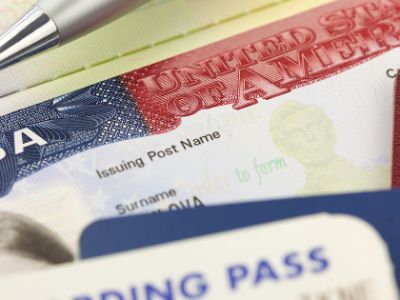You met during your exotic vacation to a faraway land and fell madly in love. Now an international marriage is in your future, and your new fiancé is returning home with you. It sounds like the plot of a reality series, but it could happen to you.
If you’re marrying a non-U.S. citizen, you’ll need to make sure you’re following the rules. That includes taking legal steps to make sure your new fiancé is in the country legally.
What is the citizenship process for my fiancé?
Marriage alone doesn’t grant a person U.S. citizenship. The road to citizenship can be a long one. Each step involves time and lots of documentation. Be careful during this process: improper disclosure and inaccuracies can delay or prevent residency or citizenship.
The U.S. Citizen and Immigration Services (USCIS) offers information and resources to help navigate the process we’ve outlined below. Depending on the status of your relationship, you may not encounter all the steps outlined below.
Get a fiancé visa.
If your significant other lives overseas and the wedding will take place in the United States, you’ll need to follow certain steps to ensure proper visas are in place. A visa is proof of a government’s approval for a foreign citizen to enter the U.S.
The visa for a fiancé is officially known as a K-1 visa. To obtain a K-1 visa you will first need to complete a Petition for Alien Fiancé form. You will also need proof of the identity, valid passports, medical examinations and evidence of your relationship. (There is no specific list of what’s considered evidence of a valid relationship, but it may include photos, communications and joint travel.)
Once the visa is approved, your fiancé is able to immigrate to the United States and the two of you have 90 days to marry. If the marriage doesn’t take place within the 90 days allowed by the visa, they must leave the United States.
Obtain resident status for your new spouse.
Once you’re married, you can apply to change the foreign spouse’s status to permanent resident status, which is commonly referred to as having a “green card.” A green card gives someone the ability to live and work in the United States permanently. This permanent resident status is conditional for individuals granted a green card within two years of marriage. The conditional status can be removed after two years of marriage.
Green cards are typically valid for 10 years and must be renewed. Despite the name, permanent resident status may be lost due to non-residency, failure to file taxes or voluntary withdrawal.
Go through the United States naturalization process.
Naturalization is the process of a permanent resident becoming a full citizen. Not all spouses will meet the eligibility requirements to become citizens, which include that the applicant must:
- Be at least 18 years old.
- Have a green card for at least three years.
- Be married and “live in marital union” with a U.S. citizen for three years before applying and up until examination of the application.
- Live in the state where filing the application for at least three months before applying.
- Have been in the United States for at least 18 months of the last three years before applying and reside continuously in the United States from the moment of applying until naturalization.
- Read, write and speak English.
- Understand civics (knowledge of U.S. history and government).
After the spousal residency requirement of three years has been met and an application has been filed, the naturalization process takes about six months to complete. An interview and citizenship test are required to complete the process.
If approved for citizenship, your spouse will take the Oath of Allegiance at a naturalization ceremony. This ceremony is presided over by a judge or administrative officer. This final step is required to complete the naturalization process.
Once a citizen, your spouse can apply for a U.S. passport and register to vote.
Other things to know before you marry someone from another country
Think before you commit marriage fraud.
Marriages for the purpose of evading U.S. immigration law are considered fraudulent. If the real reason you’re getting married is so that your spouse can become a permanent resident of the United States (“green card marriage”), seriously consider the consequences. Marriage fraud is a federal crime. The penalty is up to five years in prison and $250,000 in fines.
Sometimes U.S. citizens are targeted for marriage scams. You may have fallen in love, but how can you be sure your fiancé is just as sincere? The Center for Immigration Studies notes that middle-aged men seem to be the biggest target for these scams and points out warning signs that your relationship may be fraudulent include your significant other pushing you to marry quickly, focusing primarily on the benefits to him or her of getting U.S. residency and asking you for money.
The best advice to avoid a marriage scam is to slow down and get to know your fiancé. Seek the advice of trusted friends and family when considering an international marriage.
Planning to get married in another country?
International marriage laws can vary greatly. Foreign countries may require parental consent, residency and affidavits of eligibility to marry. If you plan to marry abroad, be sure to research that country’s marital laws. Also check with your state’s attorney general to be sure that your international marriage will be legal here in the United States.
Looking for immigration support?
Navigating your new relationship can be hard enough. Add the struggle of navigating visas and resident status, and you have a whole new level of difficulty. Seek support as you begin this citizenship journey.
- Local community support is available in many forms. English language learning and citizenship classes are common offerings.
- The U.S. Citizenship and Immigration Services agency is committed to offering programs and referrals to assist immigrants.
-
If you encounter difficulties with the visa and immigration process, consider seeking legal support. ARAG plan members have telephone access to attorneys who can give legal advice and consult on immigration processes and guidelines, the filing and processing of applications and petitions, laws and regulations of immigration benefits, and deportation and removal proceedings. They can also review your immigration application and documents and help you prepare for immigration hearings.



